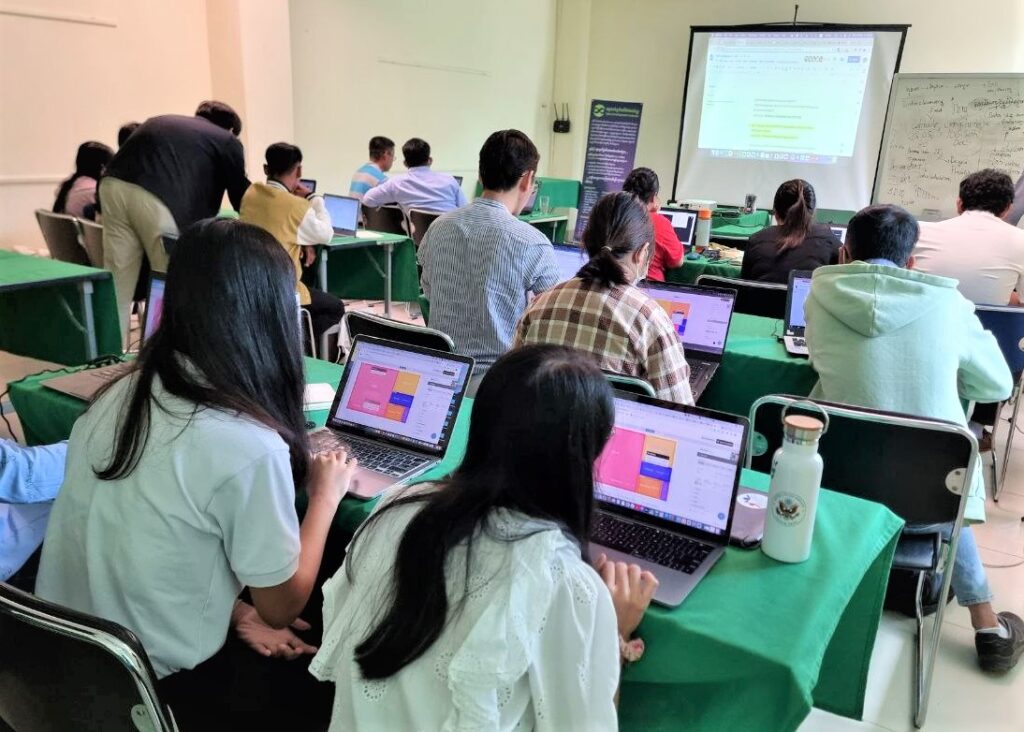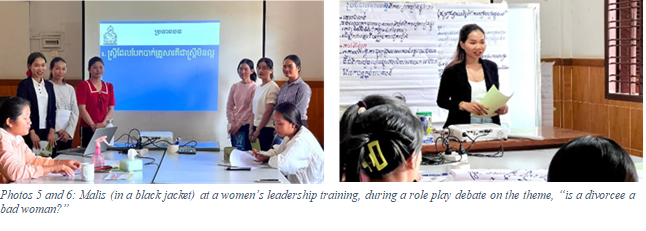The Civil Society Activity (CSS) project made significant progress in empowering indigenous voices, through its partnership with Open Development Cambodia (ODC) and Conserve Indigenous People’s Language (CIPL) Organization. Acknowledging the limitations of training every community member, the project employed a strategic approach: transmitting knowledge from focal persons to their communities. These designated individuals have become conduits for information dissemination, resulting in a profound impact.

Mr. Lao Bundinh is a 27-year-old Jarai indigenous youth living with his family in Pak Thum village, Pak Nhai commune, Ou Yadav district, Ratanakiri province. He had limited knowledge regarding social media, script writing, and other technological tools. Nevertheless, he had a strong desire to share his culture and voice with a wider audience through social media channels. He also faced a significant knowledge gap, particularly in the realm of digital security.
Throughout his active participation in project activities, training sessions, and engagement with local authorities, he gained valuable insights and became aware of the knowledge gaps he needed to address. Despite encountering various challenges, including barriers related to knowledge, technical skills, and time constraints, he persevered and continued to pursue higher levels of expertise.
He seized the opportunity to undertake the role of a trainer, conveying his acquired knowledge to indigenous youths within his community. His training sessions focused on topics such as Facebook security, Telegram two-step verification, and video production scripting. He also has gained the capability to express his insights and address community issues effectively through social media channels while sharing his knowledge within his community. He takes great pride in his personal growth and achievements, having reached this significant milestone. He remains committed to ongoing knowledge sharing and making contributions to increasing awareness among indigenous communities in the future.
Similar Stories
Data storytelling by data visualization trainees
Data is an essential component of every organization and journalist. Finding the value in data and communicating that value to your target audience needs time. Simply displaying spreadsheets with rows of numbers is insufficient for demonstrating the significance of data. However, when data is presented in the form of a story, individuals are more likely to appreciate its significance and respond accordingly. The good news is that people enjoy reading stories. Storytelling has long been a great tool for educating, explaining, and influencing a specific audience or intended activities. On 20-21 and 26 December 2022, ODC conducted training on “Data Visualization and Storytelling” to equip participants with basic data visualization and storytelling skills. The trainees have learned about the principle of data as well as using data for product visualization and short storytelling. Even though we have a short time, our trainees could produce such a visualization and combine it into a story that could present data. Note: The stories shown do not have further assessment or review. These are just participants\' practice exercises only. Story 1: The special economic zones in Cambodia The trainees produced storytelling by using visualization named \"Most of Cambodia\'s special economic zones do not unveil the specific companies\' number.\" The special economic zones in Cambodia do not show the specific number of companies, indicating that they are still in the planning stages and are not yet operational. It is critical to take more action and complete those projects with high investment capital that follow the regions. Cambodia\'s potential economic zones include Phnom Penh, Kandal, Preah Sihanouk, Svay Rieng, and Koh Kong, based on data. Story 2: Hydropower dam along the Mekong River and energy consumption Visualizations are used to illustrate the number behind the Mekong hydropower dam. Cambodia, Thailand, Laos, Myanmar, and Vietnam all have one thing in common: they would like to build a dam. As regional and global energy consumption and concern about climate change grow, one solution that can help address both at the same time is building hydropower dams in the Mekong region. Vietnam is the leading country in terms of energy consumption, with numbers steadily increasing up until the recent 2020 deadline. One thing is certain: electricity consumption is rising in all countries and shows no signs of slowing. A number of hydropower projects are planned across the five Mekong countries. Myanmar has the most hydropower plans, with a total capacity of 61,412.1 MW. However, the majority of the plans are still in the planning stages, despite the fact that Vietnam has the highest hydropower project operational rate. Renewable energy\'s future is bright, but some argue that it has taken far too long. Story 3: The most potential hydropower sites in Cambodia Our Trainees also used hydropower data from the ODC website to show which provinces have a lot of hydropower. The results show that the majority of hydropower dams are located in Cambodia\'s northeast, specifically in the provinces of Kratie, Stung Treng, and Ratanakiri. Kong Koh province also has a large number of hydropower dams. Story 4: Cambodia\'s deforestation in the last 20 years Indigenous youth from Ratanakiri province created a short story titled \"Is the forest in Cambodia truly lost?\" based on Global Forest Watch data. Data on deforestation in Cambodia show a significant increase from 2001 to 2010 but a slight decrease from 2011 to 2021. Story 5: Fishing trend by region between 2009 and 2019 in Cambodia In the short storytelling using visualization \"Fishing Activities by Zones,\" fishing zones such as the plain zone, Tonle Sap zone, plateau/mountain zone, and coastal zone are depicted. Cambodia has 20 provinces with Community Fisheries (CFi). In comparison to the other 19 provinces, Koh Kong Province has the most CFis, followed by Pursat and Prey Veng. The CFis in Svay Rieng is the fewest.
Breaking chains: A woman’s journey from a violent trap to freedom
Mrs. LEV Malis, 27, from Pouk District, Siem Reap Province was married to a violent and cheating man for seven years, with whom she had two children. Mrs. Malis got depressed and did not dare to go out or face the problem. Sometimes she considered ending her life. She had no one listen to her or be her peer support but was instead blamed by her parents for not being patient enough to be a good woman. One day, Malis met a leader of Community Based Organization (CBO), Mrs. Tep Mey, who gave her advice and referred her to the Banteay Srei Organization, which provides support to women who are victims of domestic violence. Through the support of Banteay Srei, Malis embarked on a new journey of hope, confidence, and be able to live free from violence. She left her husband, taking her two children with her, and is seeking a divorce, a decision that requires her to overcome many challenges, including social norms that frown on divorce and a difficult legal process. On September 14, 2022, Malis decided to become a volunteer for Banteay Srei. She attended her first training courses on leadership, self-awareness and facilitation skills and then joined many other workshops about gender-based violence, sexual harassment, abuse and other topics. After attending training workshops and meetings, she gained courage, and shared some of her life experiences, including how she built her self-esteem and self-motivation. In December 2022, she had gained enough confidence to be a guest speaker in the 16-day Campaign to discuss the topic “End Violence Against Women.” In early 2023, Malis started her own small business in Pouk Market, Siem Reap Province. Her business provides enough income to take care of her two children. She was inspired to share her good business start-up experience, including using digital technology and online marketing, with other women leaders at the Women Leadership Forum in April 2023.
Fostering legislative review: Empowering the implementation of Strategic Environmental Assessment (SEA)
In 2023, the Royal Government of Cambodia (RGC) took a significant step towards environmental stewardship by officially endorsing the Environment and Natural Resources Code (ENR Code). This landmark decision incorporated the implementation of the Strategic Environmental Assessment (SEA) as a pivotal element in driving development. Recognizing the significance of this initiative, ODC committed itself to actively supporting the enforcement, dissemination, and monitoring of SEA progress. As part of this commitment, on November 22, ODC, with support from USAID through FHI 360, organized a highly impactful workshop/dialogue to discuss the implementation of SEA. This event brought together key stakeholders, including the Ministry of Environment\'s Department of EIA and the National Council for Sustainable Development (NCSD), as well as representatives from the Ministry of Planning, the Ministry of Tourism, an EIA consultancy firm, and ClientEarth. The participation extended to over 50 Civil Society Organizations (CSOs), Community-Based Organizations (CBOs), journalists, and indigenous representatives from various provinces, all working collaboratively towards sustainable development and inclusivity. The success of the project implementation is evident in the positive shift observed in the behavior of relevant ministries. The increased responsiveness and active participation of these ministries showcase the tangible impact of the project. This success not only marks a significant milestone in advancing SEA implementation but also underscores the project\'s contribution to fostering positive changes within governmental entities, fostering a more collaborative and participatory approach to sustainable national development.


